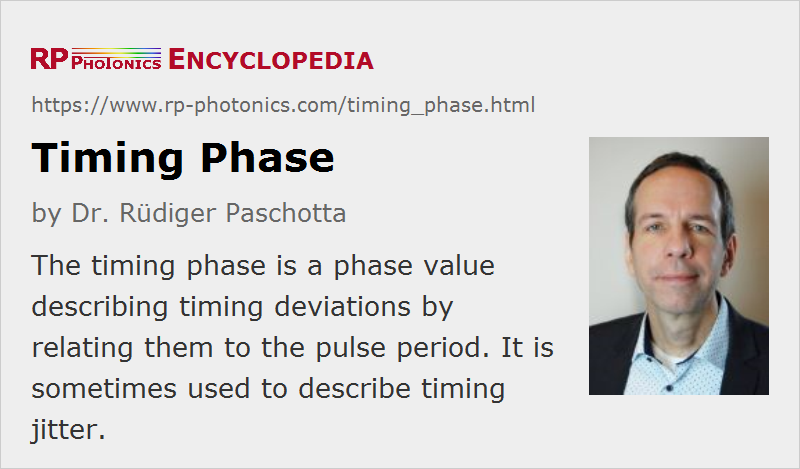Timing Phase
Definition: a phase reflecting timing deviations by relating them to the pulse period
Categories:  fluctuations and noise,
fluctuations and noise,  optical metrology
optical metrology
Units: rad
Author: Dr. Rüdiger Paschotta
Cite the article using its DOI: https://doi.org/10.61835/35e
Get citation code: Endnote (RIS) BibTex plain textHTML
In the literature, the timing jitter of a mode-locked laser is often specified as the power spectral density not of the timing deviation <$\Delta t$>, but rather of the timing phase, which is defined as follows:
$${\varphi _{\rm{t}}} = 2\pi \;\frac{{\Delta t}}{T} = 2\pi \;{f_{{\rm{rep}}}}\;\Delta t$$where <$\Delta t$> is the timing error, <$T$> is the pulse period and <$f_\rm{rep}$> the pulse repetition rate.
This definition is inspired by considering the emitted pulse train as a (usually highly anharmonic) oscillation of the optical power, which in the noiseless case can be seen as consisting of a sinusoidal signal and integer harmonics thereof, i.e. as a Fourier series. One pulse period corresponds to a change in the timing phase by 2<$\pi$>.
The power spectral density corresponding to the timing phase has units of rad2 Hz−1. It is also common to specify 10 times its logarithm to base 10 in units of dBc/Hz.
Of course, the timing phase should never be confused with the optical phase, but that may happen if “phase noise” is mentioned without making clear what kind of phase is meant. Both types of phases occur e.g. in the context of mode-locked lasers.
More to Learn
Encyclopedia articles:
Questions and Comments from Users
Here you can submit questions and comments. As far as they get accepted by the author, they will appear above this paragraph together with the author’s answer. The author will decide on acceptance based on certain criteria. Essentially, the issue must be of sufficiently broad interest.
Please do not enter personal data here; we would otherwise delete it soon. (See also our privacy declaration.) If you wish to receive personal feedback or consultancy from the author, please contact him, e.g. via e-mail.
By submitting the information, you give your consent to the potential publication of your inputs on our website according to our rules. (If you later retract your consent, we will delete those inputs.) As your inputs are first reviewed by the author, they may be published with some delay.


Share this with your friends and colleagues, e.g. via social media:
These sharing buttons are implemented in a privacy-friendly way!